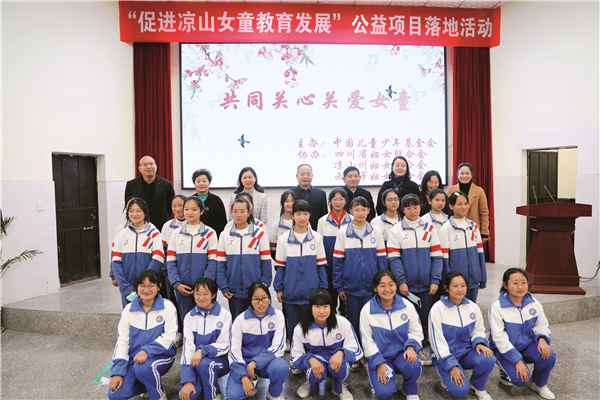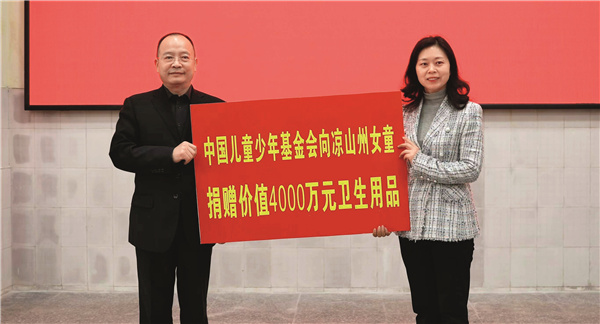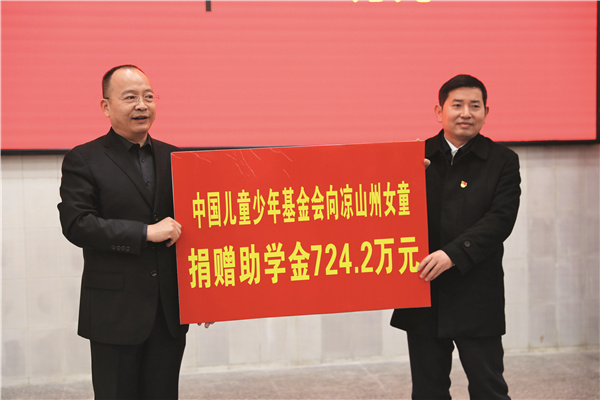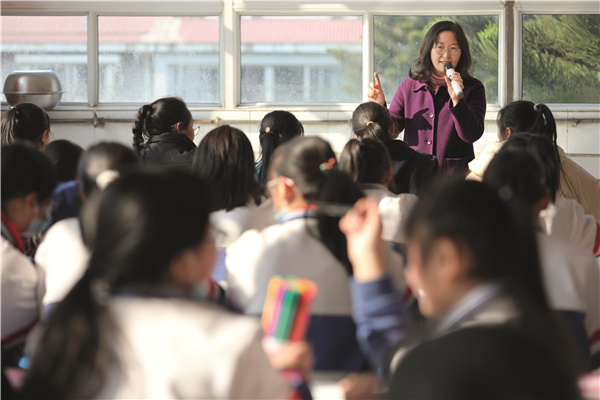Spring Bud blooms on Daliang Mountain
On October 11, 2021, which marked the 10th International Day of the Girl Child, Peng Liyuan, a special envoy for the Spring Bud Project to promote girls' education in China, announced the launch of an initiative to promote and implement the Spring Bud Project — Dream of Future Action.
On January 7, 2022, the China Children and Teenagers' Fund (CCTF) launched Promoting Development of Liangshan Girls' Education project at Xining Middle School in Liangshan Yi autonomous prefecture, Southwest China's Sichuan province, and it donated money and materials worth more than 48 million yuan (US $7.06 million) to help girls in Liangshan. As an important part of the Spring Bud Project — Dream of Future Action, the project will continue to support girls' education and all-round development in Liangshan.

The CCTF launches Promoting Development of Liangshan Girls' Education project at Xining Middle School. [CCTF]
Benefiting from Spring Bud Project
Liangshan, where Daliang Mountain is located, is home to the largest Yi community in the country. It has 4.86 million residents, more than half of whom belong to the Yi ethnic group.
In the past, only a quarter of the school-aged girls in Liangshan were enrolled in primary school, and very few of those girls finished primary school. The dropout rate of ethnic girls was high.
In 1992, with the support of Margaret Chow Kit Bing, from Hong Kong, the CCTF established Spring Bud Girls' Classes in Butuo county, in Liangshan, to help local dropout girls return to school.
Since it was launched by CCTF in 1989, the Spring Bud Project has raised more than 2.586 billion yuan, and it has used that money to help more than 3.96 million girls, including those in Liangshan, receive an education and realize their dreams.
The touching stories of Spring Bud girls who have changed their fates, and the fates of their hometowns, through education have been spreading throughout Liangshan.
'I Want to Be a Teacher'
Jidi Moshiliu, one of the first graduates of Butuo county's Spring Bud Girls' Class, is a native of Youhao, a village in Diluo town. She is now a teacher at Temuli Primary School in the county.
She began attending primary school when she was 7. At that time, she was the only Yi girl among the nearly 50 students in her class. She dropped out when she was in the fourth grade.
One day, in September 1992, the village's Party branch secretary visited Jidi's family, and told Jidi and her parents Jidi could return to school with the help of the Spring Bud Project. The family felt lucky, and excited, when they heard the news.


The CCTF donates money and materials to help girls in Liangshan. [CCTF]
"I want to be a teacher," Jidi told herself on her first day in the girls' class. She cherished the opportunity to return to school, and she studied hard. After she finished middle school, she was admitted to a normal college.

An expert gives a lecture. [CCTF]
Jidi became a teacher in 2006, after she graduated from the college. She loves her job. She says she is the happiest when she watches her students enjoy their time at school.
Jidi is the only woman teacher from her village. During the past three decades, she has witnessed great changes in her village. For example, the village has established a kindergarten, and the villagers' lives are continually improving.
She believes many of the changes in her village are the result of the implementation of the Spring Bud Project. She said she hopes all of the children on Daliang Mountain will receive a better education, and change their fates with knowledge.
Fighting fate
Wang Fumei was born in 1977 in Yizi, an ethnic Miao village deep in Daliang Mountain. She began primary school when she was 9, but she dropped out three years later. Her family lived in difficult conditions, and she had to help her parents do the farm work.
One day in August 1992, Wang heard about the Spring Bud Project. However, her parents didn't want Wang to return to school. The teachers and women's federation cadres persuaded her mother to visit the school, and the Spring Bud Girls' class. Her mother finally agreed.
At that time, there were two girls' classes in Butuo, one in Temuli Primary School, and the other in Xixihe Central School (later called Buluo Township Central School). Wang attended the latter class.
In 1996, Wang was admitted to Sichuan Radio and Television Secondary Vocational School, to study finance and accounting. After she graduated, she passed the county's civil service examination, and she worked in governmental departments in Jizhi township, Xixihe town, Buluo township and Dala township. Now, she is deputy head of Temuli town.
When she worked in Dala, she was responsible for poverty-alleviation efforts in Boshi, an Yi ethnic village. In 2016, the village's per-capita income was less than 3,000 yuan. With the government's support and the concerted efforts of Wang and the villagers, the per-capita income increased to more than 4,300 yuan, within three years, through planting fruit trees, walnut trees and other crops.
Wang also organized Yi youth to acquire employment skills, and she encouraged them to work outside of Daliang Mountain, to broaden their horizons.
Chasing the dream
Wang Fuxiu is a cousin of Wang Fumei. She dropped out of school after she concluded her primary education. In 1992, she returned to school with the help of the Spring Bud Project.
In 1993, she and two other students were selected, as excellent Liangshan Spring Bud girls, to attend the summer camp in Beijing organized by the CCTF. They participated in various activities, and they visited many sites in the city. Wang Fuxiu was more extroverted after she returned from the summer camp.
After she graduated from secondary vocational school, she passed the county's civil service examination. She applied to work in Sike, one of the most backward townships in the county. She always told the villagers about the importance of their children receiving an education. Two years later, she became president of the women's federation in Le'an township.
In 2005, she began working in the finance office in Xixihe. In 2014, she was transferred to work in the organization department of the Butuo County Committee of the Communist Party of China.
In 2016, she was responsible for poverty alleviation in Yonggedeng village. She encouraged the villagers to live a healthy lifestyle, and she arranged the construction of public restrooms and showers in the village. With her help, the villagers began planting water oats in 2019, and that helped them increase their incomes. She said she will lead women in starting their own businesses in the future.
Forging ahead
On November 17, 2020, the last seven, national-level impoverished counties in Liangshan were removed from the poverty list. People of all ethnic groups in Liangshan, with people throughout the rest of China, achieved an all-round, well-off society, and they have continued forging ahead, toward the second centenary goal, which is to build a great modern socialist country that is prosperous, strong, democratic, culturally advanced, harmonious and beautiful.
The Spring Bud Project, with a focus on poverty alleviation through education, and while promoting gender equality in education, has been operating in Liangshan for 30 years. The project has become an important force used by people of the Yi and other ethnic groups to shake off poverty and ignorance, and to start a new life of prosperity.
In January, after three months of preparations, the CCTF's Promoting Development of Liangshan Girls' Education project was launched in Xichang. The project also promotes rural revitalization, and it helps consolidate the various achievements of poverty alleviation.
Zhu Xisheng, the CCTF's then-vice-president, said the CCTF will give full play to its role as a public-welfare platform in achieving common prosperity, through the "third distribution system" (the creation of opportunities for high-income groups and enterprises to give back to society, including through voluntary gifts and charitable donations), and the CCTF will embark on a new journey toward realizing the second centenary goal, together with people of all ethnic groups in Liangshan.


